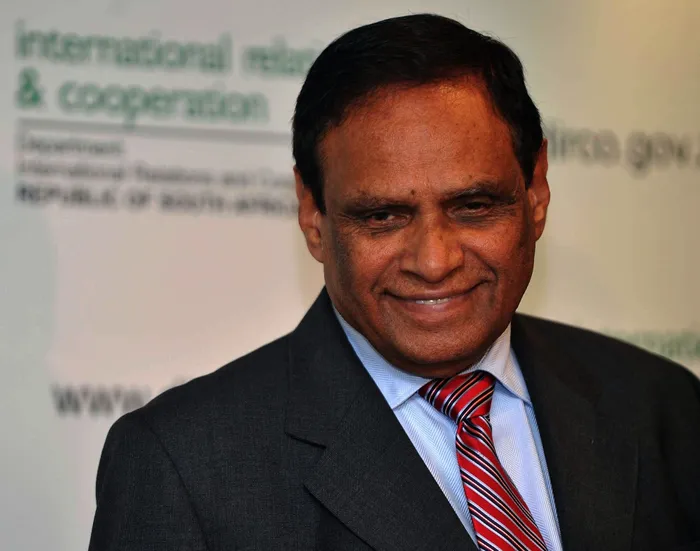Tribute to Ebrahim Ebrahim and Lindiwe Mabuza – two icons who shaped SA’s internationalism

FILE – LAte former deputy minister of international relations and cooperation Ebrahim Ebrahim. 13.11.12. File photo: Supplied/Department of International Relations, Cooperation
OPINION: As we bid farewell to these two giants, their contribution to bringing an end to apartheid is recognised, but so are the indelible marks they left in how South Africa relates to the world and how the world views us, writes Febe Potgieter.
Monday, 6th December saw the passing of two South African patriots and icons, a few hours from each other. Ebrahim Ismail Ebrahim was born in 1937 in Durban, and Lindiwe Mabuza just a year later in Newcastle.
Apart from having been born in KZN in common, both dedicated their lives to the struggle for freedom and human progress, spanning several decades. Their personalities could not have been greater opposites.
Cde Ebie, as Ebrahim was affectionately known, was a quiet, reserved and humble man, never one for the foreground. Sis Lindiwe Mabuza, on the other hand was the Grande Dame of the ANC, always elegant and outgoing, surrounded by people, she made her presence felt.
And yet the two played a pivotal role in key strands of South African international positioning. Lindiwe Mabuza, after studying and teaching in Lesotho, continued on this trajectory in the USA, moving in the circles of the South African cultural literati. Until one day around 1975, according to Caiphus Semenya, she announced that she is upping roots and going to Zambia to join the ANC.

Upon asking whether she knew anyone from the ANC, she confidently replied no, she will simply introduce herself as a South African. And that’s exactly what she did. The rest, as they say, is history. Recognising her education and eruditing, her commitment to the arts and to women’s struggle, she was assigned to Radio Freedom, and became editor of feminist journal Voice of Women, where she encouraged women to write poetry, as a way of expressing themselves.
Mabuza also chaired the ANC Cultural committee, and when the cultural group Amandla! was formed, organised tours for the group in a number of African countries, to inform their citizens of the struggle against apartheid.
In 1979 she was appointed to initiate the ANC representative offices in Scandinavia, a task she executed with much aplomb. Her work consolidated Scandinavian support for the South African liberation movements and the whole region. She did the same when assigned to the Washington ANC office, campaigning for disinvestment and sanctions, engaging artists and activists like the Reverend Jesse Jackson, Harry Belafonte, Muhammed Ali and others.
Ebrahim Ebrahim’s activism followed a completely different path. Politics grabbed his attention from an early age, when he listened to speeches in Durban by Chief Albert Luthuli and Yusuf Dadoo from the ANC and the Natal Indian Congress (NIC) respectively. Soon he was drawn into distributing pamphlets for the ANC and NIC, and so it began. This journey of activism that followed, saw him becoming one of the first recruits to join Umkhonto we Sizwe after its formation in 1961, and of the 36-odd years that he dedicated to the struggle for freedom, half were spent on Robben Island, serving two separate sentences.
Ebrahim went on to participate in South Africa’s negotiations process, the formation of the Patriotic Front and as chairperson of the Foreign Affairs Parliamentary committee during the country’s first non-racial parliament and later from 2009-2014, serving as deputy minister of international relations.
Mabuza, though serving as ambassador after 1994, most prominent contribution to shaping South African internationalism happened during the years of struggle. Her commitment to the arts saw her and others use the rich culture of South Africa – song, dance, theatre, the written word, visual arts – to convey to the world the brutality and inhumanity of apartheid.
She believed that speeches against apartheid spoke to the mind, but telling our story through arts and culture, spoke to the heart. She took this belief across the African continent with Amandla!, to the Scandinavian and other European countries and to the USA.
Her commitment to women’s emancipation was another of her hallmarks, which she combined with the arts. By encouraging exiled women to write poetry, she gave them a means of expression. She later published this poetry in a volume, Malibongwe (1980.) Lindiwe Mabuza was often the only woman in ANC delegations, and she held her own, always a presence that could not be ignored.
Thus, she helped shape two important strands of the global anti-apartheid movement, its cultural dimensions and its recognition of women’s oppression.
Ebrahim Ebrahim’s contribution to South African internationalism finds expression in the post-apartheid era. As chair of the Parliamentary committee on international relations, he internalised Madiba’s commitment to peace, friendship, solidarity and reconciliation in international relations, and Mbeki’s vision of the African renaissance, and helped give practical and strategic expression to both.
Thus over the last 27 years, in fact way beyond retirement, Ebrahim was actively involved in peace processes from Palestine, Western Sahara, and Yemen to Burundi, Rwanda, Kosovo, Bolivia and Nepal. This was informed, in his own words, by “a deep commitment for peace, freedom and prosperity for all my fellow human beings and having an equal distaste for injustice and oppression.”
What Ebrahim therefore brought to South Africa’s brand of internationalism, is its role as a global peacemaker, and the importance of solidarity with oppressed peoples elsewhere, informed by the distaste for injustice and oppression.
As we bid farewell to these two giants, their contribution to bringing an end to apartheid is recognized, but so are the indelible marks they left in how South Africa relates to the world and how the world views us.
* Febe Potgieter is former ambassador to Poland and ANC General Manager.
** The views expressed here are not necessarily those of IOL and Independent Media.
Insider